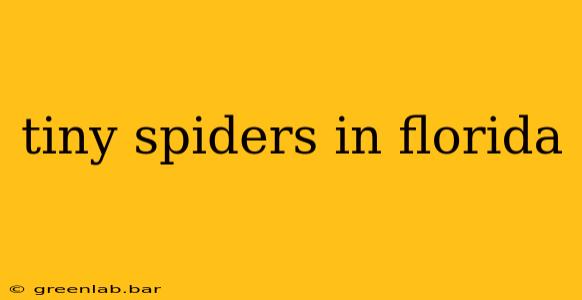Florida's warm, humid climate provides a perfect habitat for a diverse array of spiders, many of which are quite small. While most are harmless, identifying them can alleviate concerns and help you understand their role in the ecosystem. This guide explores some common tiny spiders found in the Sunshine State, focusing on identification, behavior, and potential dangers.
Identifying Tiny Florida Spiders: Challenges and Clues
Pinpointing the exact species of a tiny spider can be tricky even for experts. Many small spiders share similar characteristics, making visual identification challenging. However, paying attention to certain details can help narrow down possibilities:
Key Identification Features:
- Body Shape and Size: Note the overall shape (round, elongated, etc.) and approximate size. A ruler or even a coin for scale in a photograph can be incredibly helpful.
- Leg Length and Coloration: Leg length relative to body size is a key identifier. Color variations, banding, or unique markings on the legs can also be significant.
- Abdomen Markings: The abdomen (the rear part of the spider) often displays distinctive patterns, spots, or stripes that are crucial for identification.
- Web Type (if present): The type of web a spider spins—orb webs, sheet webs, tangle webs—can offer clues to its species.
- Habitat: Where you find the spider (indoors, outdoors, type of vegetation) provides valuable context.
Common Tiny Spider Species in Florida:
While a definitive list is impossible due to the sheer number of species, here are some commonly encountered tiny spiders in Florida:
1. Jumping Spiders (Family Salticidae):
Jumping spiders are known for their excellent vision and hunting prowess. Many are tiny, often less than ¼ inch in body length. They are usually quite colorful and hairy, often exhibiting distinct markings on their abdomens. They don't build webs to catch prey; instead, they stalk and pounce on their victims. They are generally harmless to humans.
2. Cobweb Spiders (Family Theridiidae):
This family encompasses many small spiders, often found in dark corners or under objects. Their webs are typically irregular and tangled. While some species are larger, many are quite tiny. The notorious black widow is part of this family, though black widows are easily distinguished by their size and characteristic red hourglass marking. Most tiny cobweb spiders pose no threat to humans.
3. Sheetweb Weavers (Family Linyphiidae):
These spiders create delicate, horizontal sheet webs, often close to the ground in vegetation. Many species are very small, barely visible to the naked eye. They are generally harmless to humans.
4. Other Small Spiders:
Many other spider families contain species that can be quite tiny in Florida. Accurate identification usually requires close examination and, often, the expertise of an arachnologist.
Are Tiny Florida Spiders Dangerous?
The vast majority of tiny spiders in Florida are harmless to humans. Their fangs are too small to penetrate human skin, even if they were inclined to bite (which is rare). While a bite might cause a slight irritation in some individuals, it is generally not a cause for significant concern.
However, it's crucial to remember: Even though most are harmless, it’s essential to exercise caution when handling any spider, regardless of size.
When to Seek Professional Help:
In rare instances, a spider bite could require medical attention. Seek professional medical help if:
- You experience severe pain, swelling, or allergic reactions after a suspected spider bite.
- The bite area shows signs of infection.
- You suspect you've been bitten by a venomous spider (though truly venomous tiny spiders are rare in Florida).
This guide provides a general overview. For definitive identification, consider consulting with an entomologist or using specialized field guides and online resources. Remember, most tiny spiders in Florida are beneficial members of the ecosystem, playing a crucial role in controlling insect populations. Understanding them can help us appreciate their importance and coexist peacefully.

